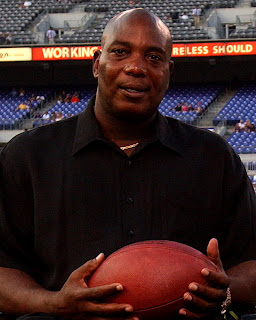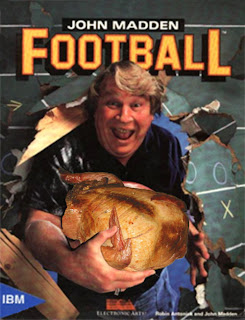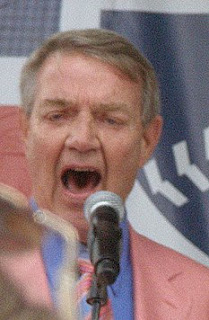 The thing about Ozzie Newsome is that (with the exception of one or two players) he possesses the ability to peer directly into the soul of an NFL prospect and determine just how good he will be as a professional football player. This, coupled with his monk-like patience, is why since joining the NFL, the Ravens' draft success has been unprecedented. So while other fans get anxious and prepare to second guess their GMs as April 25 looms (that's right, I'm talking about you, Jets fans), I and the rest of Baltimore's loyal can sit back and watch Ozzie do what he does best.
The thing about Ozzie Newsome is that (with the exception of one or two players) he possesses the ability to peer directly into the soul of an NFL prospect and determine just how good he will be as a professional football player. This, coupled with his monk-like patience, is why since joining the NFL, the Ravens' draft success has been unprecedented. So while other fans get anxious and prepare to second guess their GMs as April 25 looms (that's right, I'm talking about you, Jets fans), I and the rest of Baltimore's loyal can sit back and watch Ozzie do what he does best.What's the Best Part of the NFL Offseason? More Football!
 The thing about Ozzie Newsome is that (with the exception of one or two players) he possesses the ability to peer directly into the soul of an NFL prospect and determine just how good he will be as a professional football player. This, coupled with his monk-like patience, is why since joining the NFL, the Ravens' draft success has been unprecedented. So while other fans get anxious and prepare to second guess their GMs as April 25 looms (that's right, I'm talking about you, Jets fans), I and the rest of Baltimore's loyal can sit back and watch Ozzie do what he does best.
The thing about Ozzie Newsome is that (with the exception of one or two players) he possesses the ability to peer directly into the soul of an NFL prospect and determine just how good he will be as a professional football player. This, coupled with his monk-like patience, is why since joining the NFL, the Ravens' draft success has been unprecedented. So while other fans get anxious and prepare to second guess their GMs as April 25 looms (that's right, I'm talking about you, Jets fans), I and the rest of Baltimore's loyal can sit back and watch Ozzie do what he does best.John Madden Retires: Another One Bites The Dust

As soon as I write a post about one announcer passing away, another one retires. That's right, everyone's favorite sportscaster, John "Captain Obvious" Madden, is calling it quits. And after a successful career coaching, commentating, and eating copious amounts of turducken, he deserves some time away from the game. I can see it now, just him and the Madden Bus cruising down the open road, not a worry in his mind.
More Than A Voice

This is not how I envisioned my blog’s first post. I was expecting to come up with some snarky entry criticizing one or more teams, picking a bone with the practices of a sports league, or sticking it to society as a whole for one annoying habit or another. But my plans changed a few days ago, when the tragic news of sportscaster Harry Kalas’ death got me thinking.
For the uninformed, Harry Kalas was perhaps best known as the play-by-play commentator for the Philadelphia Phillies. I personally knew Kalas as the voice of NFL Films, those overly dramatic retellings of the greatest football games ever played. Kalas’ smooth, Sinatra-esque voice coupled with the blood-pumping music of the NFL Films’ orchestra still gives me chills. What struck me most about the death of Kalas, though, was how struck everyone else was, which had me asking the question, “why exactly are sports commentators so important to us?” With the way Sportscenter treated the death, one would think that Hank Aaron or Brooks Robinson had passed away.
My first guess would be that, aside from the franchises themselves, sportscasters carry the most longevity. Star athletes are here one year and gone another, but the voices of our announcers stay with us through decades. I’ve been listening to John Madden stumble his way through football games for longer than I can remember.
Secondly, sportscasters are the ones that teach us the game. Sure, my father was also there to explain how football, baseball, and the rest were played. But sportscasters are the experts; they point out the nuances of the game, telling us why a player needs to turn toward the basket on a pick and roll and why a running back needs to keep a low center of gravity.
My other thought is that sportscasters are sort of the middle ground between the athletes and us. While some have athletic experience, others are just normal guys with cool voices and an interest in the games. They’re often more relatable than the athletes, and for this reason, their leathery voices and hip catchphrases ring in our head’s for ages. Kalas’ most famous phrase had to be his exclamation of “outta here!” when a homerun was hit.
He first used the phrase in the early 70s after hearing Phillies shortstop Larry Bowa use it during batting practice. Now the phrase is a staple of the game, with countless other announcers uttering the words after the excitement of a home run. But Kalas will be remembered for more than those two words. He will also be remembered as the man who guided millions through a game that they love to watch. He died at 73 in the press box before a Phillies game, preparing to do what he loved to do best.

